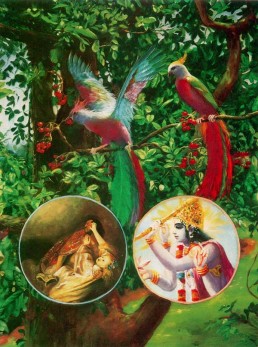Commentary
Knows Me: Knowing not merely by emotion but by spiritual understanding achieved through one’s identification with the Self.
Unborn: The Infinite cannot be born because It never expresses Itself in any finite manifestation. The ghost is born and hence it has to die ; but the post cannot be said to have given birth to the ghost nor it has taken birth from the ghost. The post was, is and shall always be a post only. Similarly, The Self is eternal and therefore It is birthless.
Beginningless: Everything is born in the Self, exists in the Self and ends in the Self. Waves are born but ocean is birthless. Every wave – every manifestation- has a beginning and an end but the ocean has none. Hence the Self is beginningless.
Supreme Lord of the Worlds: `World’ includes not only the objective world perceived by our physical senses but also the world of feelings and emotions experienced by us. Experiences of the body, mind and intellect cannot be ours unless we are constantly aware of them. This awareness or Consciousness or Self is that which rules our `world’ which is called the `Supreme Lord of the worlds’.
When we learn to look at things as derived from the One Transcendent Reality, we are delivered from all gropings and bewilderment.
Swami Chinmayananda
Swami Chinmayananda Commentary
The commentary on this verse and the rest, is avaialble for free as:
Kindle eBook
Google Play Book
Apple Books
Adi Sankara Commentary
Yah, he who; vetti, knows; mam, Me; ajam, the birthless; and anadim, the beginningless: Since I am the source of the gods and the great sages, and nothing else exists as My origin, therefore I am birthless and beginningless. Being without an origin is the cause of being birthless. He who knows Me who am thus birthless and beginningless, and loka-maheswaram, the great Lord of the worlds, the transcendental One devoid of ignorance and its effects; sah, he; the asammudhah, undeluded one; martyesu, among mortals, among human beings; pramucyate, becomes freed; sarva-papaih, from all sins-committed knowingly or unknowingly.’For the following reason also I am the great Lord of the worlds:’
The Bhagavad Gita with the commentary of Sri Sankaracharya – Translated by Alladi Mahadeva Sastry
Holy Geeta – Commentary by Swami Chinmayananda
The Bhagavad Gita by Eknath Easwaran – Best selling translation of the Bhagavad Gita
The Bhagavad Gita – Translation and Commentary by Swami Sivananda
Bhagavad Gita – Translation and Commentary by Bhaktivedanta Swami Prabupadha
Srimad Bhagavad Gita Chapter 10 – Verse 3 – 10.3 yo mamajamanadim – All Bhagavad Gita (Geeta) Verses in Sanskrit, English, Transliteration, Word Meaning, Translation, Audio, Shankara Bhashya, Adi Sankaracharya Commentary and Links to Videos by Swami Chinmayananda and others – 3-Oct

